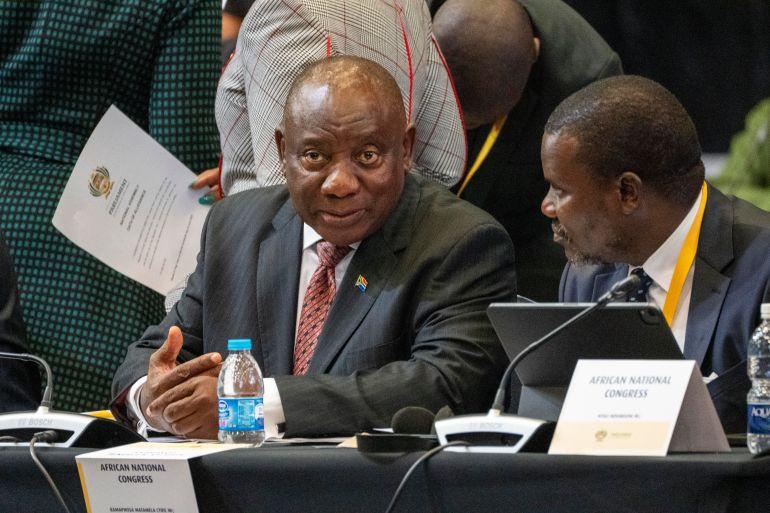Source: ALJAZEERA
ALJAZEERA MEDIA NETWORK

An 11th-hour agreement between the ANC and rival parties has led to South Africa’s first coalition government. Analysts predict challenging times ahead.
Cape Town, South Africa — Intense late-night negotiations culminated in the formation of South Africa’s unprecedented coalition government on Friday, spearheaded by President Cyril Ramaphosa.
The multiparty coalition finalized their pact only Friday, after rounds of exhaustive talks and phone calls among Ramaphosa and leaders of other political groups as Parliament members were sworn in.
On Friday evening, Ramaphosa was on the verge of being voted in as the president of the country. With the unique coalition deal, the Democratic Alliance (DA), the former opposition, and the Inkatha Freedom Party (IFP) are slated to support an ANC president for the first time.
The coalition formed after the ANC experienced its steepest electoral downturn in three decades. The party secured 159 out of 400 parliamentary seats—falling short of the 201-seat majority—having captured 40% of the votes in the May 29 election.
Following internal deliberations, Ramaphosa announced last week that the ANC would pursue a “government of national unity”. However, the EFF and Jacob Zuma’s uMkhonto weSizwe (MK Party), which emerged just before the election and pulled traditional ANC voters, declined to join the government, especially since the DA was involved. The MK Party also demanded Ramaphosa’s resignation.
Now the right-leaning DA, with 21% of the seats, partners with the ANC, supported by the nationalist IFP. The parties have crafted an eight-page framework for their unity government, stipulating that decisions require “sufficient consensus”.
This ensures that neither Ramaphosa nor the ANC can make unilateral decisions. The agreement emphasizes ten core principles, including constitutional respect and stances against racism and sexism.
The coalition accord prioritizes “rapid, inclusive, and sustainable economic growth”.
Former DA leader and negotiator Tony Leon remarked on the unexpected coalition between the ANC and DA.
“I last negotiated with the ANC in 1996 when they had 62% support,” he shared.
Leon described recent talks as “extremely challenging” but noted that electing the president was the “simple part”.
“The upcoming five years will be tough,” he added, emphasizing the necessity of trust for the coalition to function effectively.
Leon mentioned that agreements were still being finalized five minutes before Parliament’s 10 am local time (08:00 GMT) session began on Friday.
“We outlined modalities and broad principles. Ultimately, this will hinge on trust between parties,” he said.
The agreement did not specify which parties will fill government positions. Ramaphosa has until Wednesday to make these decisions, with his inauguration scheduled for next Wednesday.
Per the agreement, Ramaphosa must consult coalition leaders before appointing ministers and deputies.
Constitutional law expert Pierre de Vos from the University of Cape Town expressed concerns about the coalition government’s potential impact on governance.
“Confidence in the future is challenging,” he noted.
De Vos argued that while a coalition government seems favorable on paper, South Africa's diverse society, united by the ANC for 30 years, poses challenges. “On difficult issues like inequality and racism, the parties are diametrically opposed,” he added.
The DA opposes race-based transformation policies, which the ANC has championed for decades.
Other analysts believe the coalition will push ideological parties toward the center.
“This agreement is beneficial. It shifts the ANC toward the center and the DA from the far right,” said political analyst JP Landman.
Your email address will not be published. Required fields are marked *